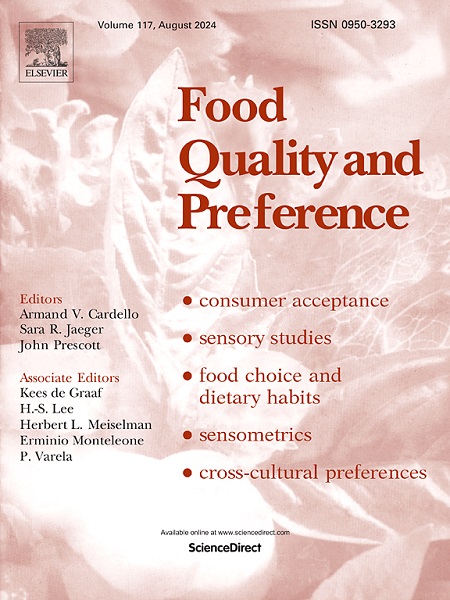外出就餐:大学生新食物恐惧症(FNS)和食物生活满意度(SWFLS)量表的定量分析
IF 4.9
1区 农林科学
Q1 FOOD SCIENCE & TECHNOLOGY
引用次数: 0
摘要
在食品工业日益全球化的背景下,年轻人接触到各种各样的食物和烹饪传统,这挑战了他们既定的和传统的食物偏好。在离家生活的情况下,食物选择的过程尤其明显,因为在这种情况下,需要独立管理自己的饮食,对新食物的反应可能有很大的不同,从接受到拒绝。此外,这些动态有可能影响幸福感和满意度,这是在向自主过渡的过程中生活质量的关键因素。本研究以227名远离原籍家庭的意大利大学生为样本,研究了食物恐惧症与食物相关满意度之间的关系,试图通过聚类分析和多重对应分析对学生进行分类,以确定学生的食物消费偏好。一份在线问卷用于收集社会人口变量、新食物恐惧症水平和与食物相关的生活满意度的数据。该分析确定了两种消费者特征:第一种特征是不愿尝试新食物,对食物的满意度较低;其次是对新食物的开放态度和更高的食物满意度。研究结果表明,社会人口学特征,包括性别、年龄、收入和研究领域,对新食物恐惧症和食物健康之间的关系产生了影响。该研究表明,旨在减少新食物恐惧症的干预措施可以改善这一人群与食物相关的生活质量。此外,文化融合和饮食自主似乎是促进学生福祉的关键因素。本文章由计算机程序翻译,如有差异,请以英文原文为准。
Eating away from home: A quantitative analysis of food neophobia (FNS) and satisfaction with food life (SWFLS) scales among university students
In the context of increasing globalization of the food industry, young adults are exposed to a variety of foods and culinary traditions that challenge their established and traditional food preferences. The process of food choice is particularly evident in the context of living away from home, where independent management of one's diet is required and where reactions to new foods can vary widely, from acceptance to rejection. Furthermore, these dynamics have the potential to affect well-being and satisfaction, which are critical elements of quality of life during this transition to autonomy. This study examines the relationship between food neophobia and food-related satisfaction in a sample of 227 Italian university students living away from their families of origin, trying to determine the food consumption preferences of students by categorizing them by performing a clustering analysis and using a multiple correspondence analysis.
An online questionnaire was used to collect data on sociodemographic variables, levels of food neophobia, and food-related life satisfaction. The analysis identified two consumer profiles: the first characterized by reluctance to try new foods and low food satisfaction; the second by openness to new foods and higher food satisfaction. The results demonstrate the impact of sociodemographic characteristics, including gender, age, income and field of study, on the relationship between food neophobia and food well-being. The study suggests that interventions aimed at reducing food neophobia could improve food-related quality of life in this population. In addition, cultural integration and food autonomy appear to be key factors in promoting student well-being.
求助全文
通过发布文献求助,成功后即可免费获取论文全文。
去求助
来源期刊

Food Quality and Preference
工程技术-食品科技
CiteScore
10.40
自引率
15.10%
发文量
263
审稿时长
38 days
期刊介绍:
Food Quality and Preference is a journal devoted to sensory, consumer and behavioural research in food and non-food products. It publishes original research, critical reviews, and short communications in sensory and consumer science, and sensometrics. In addition, the journal publishes special invited issues on important timely topics and from relevant conferences. These are aimed at bridging the gap between research and application, bringing together authors and readers in consumer and market research, sensory science, sensometrics and sensory evaluation, nutrition and food choice, as well as food research, product development and sensory quality assurance. Submissions to Food Quality and Preference are limited to papers that include some form of human measurement; papers that are limited to physical/chemical measures or the routine application of sensory, consumer or econometric analysis will not be considered unless they specifically make a novel scientific contribution in line with the journal''s coverage as outlined below.
 求助内容:
求助内容: 应助结果提醒方式:
应助结果提醒方式:


